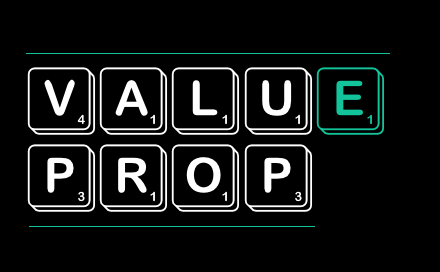Value prop
Having written about the Flywheel last week, I thought I’d move to another tool that I am finding helpful as I build my business. And like the flywheel, it’s also good for helping me redefine myself now that I’ve left Corporate Adam behind.
The value proposition.
It’s one of those terms banded around but I think very few of us give it the attention it merits. It’s after all the crux of the business.
I can’t count the number of times I’ve sat in meeting rooms where someone has asked “what’s the value proposition?” and it’s elicited a load of arm waving, buzzword bingo and waffle. And of course I hold my hand up too: I’ve done my fair share of waving and waffle.
I’ve developed dozens of value props over the years for clients, for bp’s businesses and for the startups with whom I’ve worked. But I’ll admit I’ve never found them easy.
Part of the challenge is they tend to be pretty subjective. Good Ones aren’t, but the process of defining your value proposition is likely to yield some pretty ropey ones before that Good One emerges.
The theory
The value proposition describes:
Value implies that the customer believes that some benefit will be delivered and experienced.
Or not. Because it’s not relevant, it’s not sufficient or it’s not very good.
Developing your value proposition
Another reason why value propositions are tricky is because they are deceptively simple.
But there are templates to help. One of the last ones I did at bp used Simon Sinek’s what/how/why circles which worked especially well in communicating our offer externally, with the emphasis on our ‘Why’. It was also a good way to enrol the team.
But the one I like the best is from Strategyzer, who I reckon strike the right balance between structure and simplicity. The Strategyzer Value Proposition canvas looks like this, although I’ve modified it a bit by emphasising the promise or contract between business and customer.
Starting on the right, first think of the Jobs the customer has to get done, and then the Pains they experience and the potential Gains they could make, if those Jobs are done well, more easily, more enjoyably etc.
On the left is you, your Products, services, brand etc that take away pain for your customer (Pain relievers) or add joy and wonder to their lives (Gain creators).
Your value proposition is right if there’s a direct line between what you offer and what is most valued by your customer – and it feels like a commitment or a promise you can make.
Value prop beyond business
So, no question, the value prop is a critical tool for everyone starting a new business. But it can also be helpful in building or improving a relationship. This week I joined Techstars for Mentor Madness. I’m mentoring the latest cohort of energy startups using what I’ve learnt over the years about customer discovery and marketing.
Mentor Madness is like speed-dating: 20 minutes with each startup where each side listens to what the other offers. It’s frenetic, educational and tremendous fun. As a mentor, you quickly gain a sense who you can help most, based on the startup’s jobs, pains and gains and what you have to offer.
At the end of four and a half hours, both sides record who they’d like to be paired with. There are over a hundred mentors, so the startups have a wide choice – in other words they are the customers!
Using the value prop
Here’s a few tips to help you use the value proposition:
Take a look at some good value propositions, particularly from brands you support – and see if they describe their offer and value to you.
Grab a value proposition template – here’s a link to a bunch and another– and work through your own.
Don’t limit yourself to thinking about your value proposition for just your business venture; what’s your value prop for your family, those you mentor, your community?
Test your value prop – this is the brave step – see how it resonates with your “customer” – have you captured their jobs, pains and gains as they would prioritise them? Will your offer relieve their pain or create gain?
And finally…
We are all walking value propositions if you think about it – well, all of us who want to be helpful or useful in the world. Spending time empathising with those around us, trying to understand what would improve their lives and knowing how we can do that – that’s really the core of what most of us do.
Writing it down feels like an important stage in our new identities as we break away from our corporate selves and embark on new careers and lives. I think it’s time well spent.








